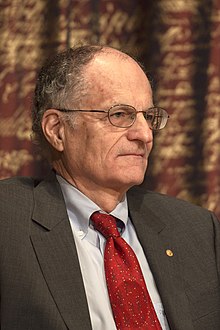Thomas J. Sargent
Thomas John "Tom" Sargent (lahir 19 Juli 1943) adalah seorang ekonom dari Amerika yang menekuni bidang ekonomi makro, ekonomi moneter dan ekonometrika deret waktu. Pada tahun 2011, ia masuk urutan ke-17 ekonom yang paling berpengaruh di dunia.[1] Ia mendapat hadiah Nobel bidang ekonomi pada tahun 2011 bersama Christopher A. Sims atas hasil penelitian empiris mereka mengenai efek makro ekonomi.[2]
| Thomas J. Sargent | |
|---|---|
 | |
| Lahir | 19 Juli 1943 Pasadena, Kalifornia |
| Kebangsaan | Amerika |
| Institusi | New York University |
| Bidang | Macroeconomics, monetary economics |
| Alma mater | UC Berkeley, (B.A.) Harvard University, (PhD) |
| Dipengaruhi | Robert Lucas, Jr. |
| Penghargaan | Pengharhaan NAS untuk para ilmuwan (2011) Nobel Ekonomi (2011) |
| Informasi di IDEAS / RePEc | |
| Penghargaan
| |
Pendidikan
suntingSargent memperoleh B.A.-nya dari University of California, Berkeley tahun 1964 dan Ph.D.-nya dari Harvard tahun 1968. Ia pernah mengajar di University of Pennsylvania (1970–1971), University of Minnesota (1971–1987), University of Chicago (1991–1998), Stanford University (1998–2002) dan Princeton University (2009).
Penghargaan Nobel
suntingPada 10 Oktober 2011, Sargen bersama dengan Chris Sims mendapat penghargaan Nobel dalam bidang ekonomi. Penghargaan ini dipersembahkan atas jasa mereka dalam penelitian empiris hubungan sebab-akibat makro ekonomi "empirical research on cause and effect in the macroeconomy".[3]
Publikasi
sunting- Sargent, Thomas J. (1971). "A Note on the Accelerationist Controversy". Journal of Money, Credit and Banking. Blackwell Publishing. 3 (3): 721–25. doi:10.2307/1991369. JSTOR 1991369.
- Sargent, Thomas J., and Neil Wallace (1973). "The Stability of Models of Money and Growth with Perfect Foresight". Econometrica. The Econometric Society. 41 (6): 1043–48. doi:10.2307/1914034. JSTOR 1914034.
- Sargent, Thomas J. (1979, 1987). Macroeconomic Theory. New York: Academic Press. ISBN 0-12-619750-4.
- Sargent, Thomas J. and Lars P. Hansen (1980). "Formulating and Estimating Dynamic Linear Rational Expectations Models". Journal of Economic Dynamics and Control. 2 (1): 7–46. doi:10.1016/0165-1889(80)90049-4.
- Sargent, Thomas J. and Neil Wallace (1981). "Some Unpleasant Monetarist Arithmetic". Federal Reserve Bank of Minneapolis Quarterly Review. 5 (3): 1–17.
- Sargent, Thomas J. (1983). “The Ends of Four Big Inflations” in: Inflation: Causes and Effects, ed. by Robert E. Hall, University of Chicago Press, for the NBER, 1983, p. 41–97.
- Sargent, Thomas J. (1987). Dynamic Macroeconomic Theory. Harvard University Press. ISBN 0-674-21877-9.
- Sargent, Thomas J. and Albert Marcet (1989). "Convergence of Least Squares Learning Mechanisms in Self-Referential Linear Stochastic Models". Journal of Economic Theory. 48 (2): 337–368. doi:10.1016/0022-0531(89)90032-X.
- Sargent, Thomas J. and Albert Marcet (1989). "Convergence of Least Squares Learning in Environments with Hidden State Variables and Private Information". Journal of Political Economy. 97 (6): 251. doi:10.1086/261603.
- Sargent, Thomas J. and Lars Ljungqvist (2000, 2004). Recursive Macroeconomic Theory. MIT Press. ISBN 0-262-12274-X.
- Sargent, Thomas J. and Lars Hansen (2001). "Robust Control and Model Uncertainty". American Economic Review. 91 (2): 60–66. doi:10.1257/aer.91.2.60.
Referensi
sunting- ^ "Economist Rankings at IDEAS". Ideas.repec.org. Diakses tanggal 2011-10-10.
- ^ Nobel Prize Press Release
- ^ "The Prize in Economic Sciences 2011". Nobelprize.org. 2008-12-10. Diakses tanggal 2011-10-10.